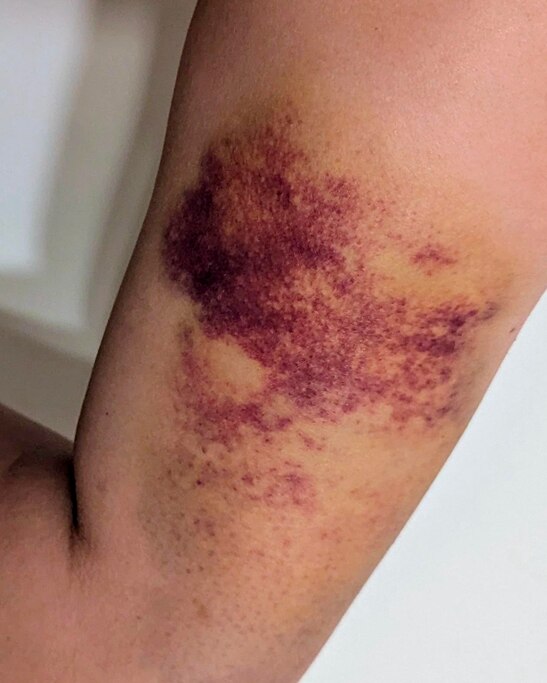Students who formed a short-lived pro-Palestine encampment at the Johns Hopkins University are accusing university and Baltimore police of using excessive force to disperse them, and a community group is calling for an independent investigation.
Johns Hopkins officials, on the other hand, say the situation was resolved “in an orderly and highly professional matter,” with university officials on site observing no injuries.
Baltimore Police body-worn camera footage of the incident could help resolve the discrepancy.
Approximately 25 members of the Hopkins Justice Collective and the Hopkins Graduate Students for Justice in Palestine formed the small encampment on the Keyser Quad in the early hours of May 8 to protest the university’s response to the Israel-Palestine conflict. The same groups made headlines last spring for a multiday protest as college students across the country sparred with their administrations.
Johns Hopkins police clear encampment at university (Baltimore City Police Department)
Police footage shows an officer arriving to the scene at 5:18 a.m. A Hopkins staffer, wearing a jacket and tie, can be seen speaking with two members of the encampment, who are wearing head coverings and refuse to share their names.
Read More
Less than 10 minutes later, Dr. Branville Bard, the university’s vice president for public safety and chief of police, arrives at the scene.
“This set-up is in violation of policy,” Bard tells protesters. “You are hereby notified that you have to disperse. If you don’t disperse, we will take action.”
As the sky lightens, tensions begin to rise.
One protester asks: “Why are you sending the police on us? Your own students!”
At 5:35 a.m., Johns Hopkins police officers begin to physically pull a large canopy off of protesters. They had already worked to dismantle two smaller tents on the green.
“JHPD, KKK, IDF they’re all the same,” protesters chant as Bard tells them to leave.
At 5:40 a.m., protesters begin to disperse. Some hang back to speak with Hopkins staffers, including one who says: “I have nothing to say. I am appalled you would use force on your students and expect us to have a good-faith conversation.”
As the protesters pack up the canopy’s metal arms, Bard offers to clean it up for them.
“I think you carrying that might be a safety danger,” he tells protesters.
“Oh, but not you beating us up?” one responds defiantly.
Police do not appear to touch or grab students in the video.
The Baltimore Police Department is committed to protecting the right to peacefully assemble, Lindsey Eldridge, a spokesperson for the department said. Eldridge added that the police’s response to the encampment “demonstrated our dedication to constitutional policing.”
The Council on American-Islamic Relations is now calling for an independent investigation into the alleged altercation and potential use of excessive force. CAIR received complaints of “at least 30 officers” deployed with an “excessive use of force, physical harassment and threats,” a spokesperson wrote.
The Hopkins Justice Collective did not respond to an interview request but wrote on Instagram that “Hopkins students’ peaceful demonstration was met with indiscriminate, unrestrained, egotistical aggression” from university and city police officers.
The group shared what it said were images of one protester’s bruising after Hopkins police officers pulled the tented canopy off of the group. In videos released by the group, protesters are seen hanging onto the canopy while Hopkins officers yank it down.

“Y’all are hurting us,” one protester can be heard saying. “You’re hurting your own students, you’re supposed to protect us!”
A Johns Hopkins Police Department spokesperson pointed to the department’s policy handbook, which states that “officers seek to avoid any use of force by applying de-escalation strategies” and “may only use the least amount of force that is reasonable, necessary, and proportional to control an incident, effect an arrest, or protect themselves or others from harm or death.”
CAIR considers police use of force excessive when it “surpasses what’s necessary to achieve a legitimate, constitutionally sound objective, resulting in unnecessary mental, physical or emotional harm and/or bodily injury to individuals, in this case students.”
The student protestors are demanding the university to divest its endowment from Israel, boycott Israeli academia and “fully disclose its complicity in the crimes committed against Palestinians.” The groups are also asking Hopkins to declare itself a “sanctuary campus,” abolish its private police force and convert the university’s Applied Physics Laboratory “from a manufacturer of death to a laboratory dedicated to scientific research for humanity.”
Hopkins, which has had federal funding threatened because of antisemitism concerns, affirmed earlier this year that it would not cut financial ties with Israel. The university is one of 10 identified by the Trump administration’s Federal Task Force to Combat Anti-Semitism, which has stripped Columbia University and Harvard University of funding.
In an email sent to students, faculty and staff last week, Bard and Rachelle Hernandez, the university’s vice provost for student affairs, wrote that the protesters’ chants are under investigation for violation of student conduct.
“Johns Hopkins supports free speech, including protest and demonstration,” they wrote. “But encampments are not how we engage with one another as a community.”
Baltimore Banner reporter Ben Conarck contributed to this article.
About the Education Hub
This reporting is part of The Banner’s Education Hub, community-funded journalism that provides parents with resources they need to make decisions about how their children learn. Read more.




Comments
Welcome to The Banner's subscriber-only commenting community. Please review our community guidelines.